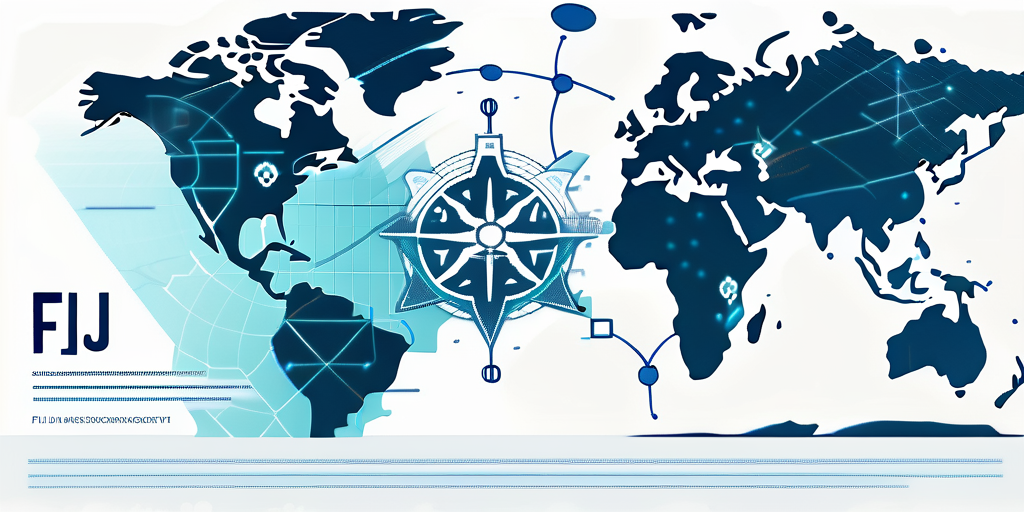Fiji, a small island nation in the South Pacific, has made significant strides in recent years to strengthen its law enforcement system and actively engage in global crime control measures. One notable development in Fiji’s efforts is its integration into the Red Notice system, facilitated by Interpol. This article aims to provide a comprehensive understanding of Fiji’s law enforcement system, the concept of Red Notice, Fiji’s engagement with Red Notice, and the implications of this leap for global law enforcement. Additionally, it will explore future prospects and potential developments for Fiji in the field of international crime control.
Understanding Fiji’s Law Enforcement System
Before delving into the specifics of Fiji’s engagement with Red Notice, it is essential to comprehend the country’s law enforcement system. Fiji’s law enforcement has undergone significant changes throughout its history, shaping its current structure and functioning.

Let’s take a closer look at the historical overview of Fiji’s law enforcement to gain a deeper understanding of its evolution.
Historical Overview of Fiji’s Law Enforcement
The law enforcement system in Fiji, like many other countries, has roots in its colonial past. During the British colonial era, Fiji adopted law enforcement practices influenced by the British system. However, it is important to note that Fiji has also incorporated indigenous knowledge and traditions into its law enforcement practices.
Over time, Fiji has strived to adapt its law enforcement to local needs and international standards. This adaptation process has been a delicate balance between preserving cultural heritage and embracing modern approaches to law enforcement.
Current Structure and Functioning
Today, Fiji’s law enforcement system comprises various organizations that work collaboratively to maintain law and order, prevent crime, and provide justice to the nation’s citizens.
The Fiji Police Force, as the primary law enforcement agency, plays a crucial role in ensuring public safety and upholding the rule of law. They are responsible for preventing and investigating crimes, maintaining public order, and providing assistance to those in need.
In addition to the police force, Fiji also has the Fiji Corrections Service, which is responsible for the management and rehabilitation of offenders. Their focus is on providing a safe and secure environment for inmates while offering programs that aim to reduce recidivism rates and promote successful reintegration into society.
The Fiji Revenue and Customs Service plays a vital role in enforcing customs and tax laws, ensuring compliance, and facilitating legitimate trade and travel. Their efforts contribute to the economic stability and growth of the nation.
Lastly, the Legal Aid Commission provides legal assistance and representation to individuals who cannot afford legal services. They play a crucial role in ensuring access to justice for all Fijians, regardless of their financial circumstances.
By having a diverse range of organizations working together, Fiji’s law enforcement system strives to maintain a safe and just society for its citizens.
The Concept of Red Notice
One crucial aspect of Fiji’s leap into global law enforcement is its engagement with the Red Notice system. Red Notice is an internationally recognized tool used by Interpol to assist member countries in locating and apprehending individuals wanted for extradition or prosecution.

Definition and Purpose of Red Notice
A Red Notice is essentially a request to law enforcement agencies worldwide to locate and arrest a wanted person. It serves as a global alert, providing essential information about the fugitive, including their identity, the crimes they are accused of, and any additional details that aid in their apprehension.
The Role of Interpol in Red Notices
Interpol, the world’s largest international police organization, plays a pivotal role in the Red Notice system. It facilitates information sharing and cooperation between member countries’ law enforcement agencies, enhancing their ability to combat transnational crime effectively.
Fiji’s Engagement with Red Notice
Recognizing the importance of international cooperation in combating crime, Fiji has undertaken comprehensive efforts to integrate into the Red Notice system and benefit from its network of law enforcement agencies across the globe.
The Process of Fiji’s Integration into the Red Notice System
Fiji’s journey towards integration into the Red Notice system has involved several stages. These include aligning its legislation with international standards, enhancing information-sharing capabilities, and establishing effective coordination mechanisms within Fiji’s law enforcement agencies.
Challenges and Opportunities for Fiji
While Fiji’s engagement with Red Notice presents exciting opportunities, it also faces certain challenges. Adapting to changing technologies, ensuring sufficient resources and training for law enforcement personnel, and maintaining effective cooperation with other countries are some key areas requiring continuous attention.
Implications for Global Law Enforcement
Fiji’s leap into global law enforcement through its engagement with Red Notice carries significant implications for international crime control efforts and the wider field of law enforcement worldwide.
Impact on International Crime Control
Fiji’s integration into the Red Notice system strengthens global crime control by creating a seamless network for information sharing, collaboration, and extradition. The ability to apprehend wanted individuals across borders enhances the overall efficiency and effectiveness of international law enforcement.
Fiji’s Contribution to Global Law Enforcement
Additionally, Fiji’s engagement with Red Notice signifies its commitment to combating transnational crime and contributing to global law enforcement initiatives. By actively participating in international crime control efforts, Fiji establishes itself as a valuable partner in ensuring global security and justice.
Future Prospects for Fiji in Global Law Enforcement
Looking ahead, Fiji’s integration into the Red Notice system opens avenues for potential developments and innovations, paving the way for even greater effectiveness in global crime control measures.

Potential Developments and Innovations
As crime evolves, so must law enforcement strategies. Fiji can explore the adoption of advanced technologies, such as artificial intelligence and data analytics, to enhance its investigative capabilities and strengthen cooperation with international partners. Collaboration on research and development projects can also foster innovative solutions to emerging challenges.
Strategic Steps for Further Integration
To maximize the benefits of its engagement with Red Notice, Fiji can proactively take strategic steps, such as capacity building programs, cross-training opportunities with other law enforcement agencies, and strengthening its legal framework. These initiatives will ensure sustained progress and continued contribution to global law enforcement endeavors.
In conclusion, Fiji’s leap into global law enforcement through its integration into the Red Notice system represents a significant milestone in the nation’s commitment to combating transnational crime. By understanding Fiji’s law enforcement system, the concept of Red Notice, and the implications of this connection, we appreciate the invaluable role Fiji plays in international crime control. With promising future prospects and a strategic approach to further integration, Fiji’s contribution to global law enforcement will undoubtedly continue to strengthen.
